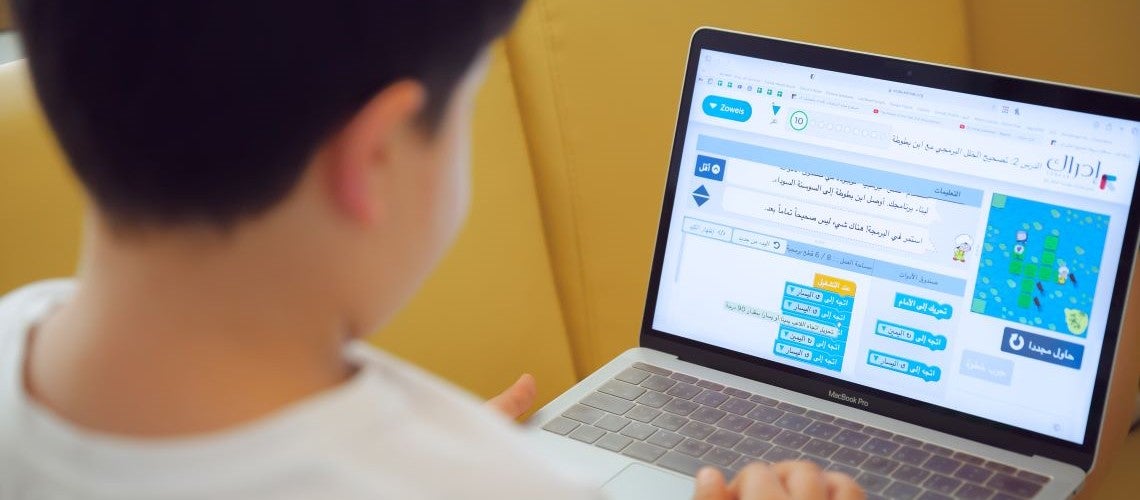 طالب صغير السن يكتب على جهاز الكمبيوتر المحمول (لابتوب) الخاص به.
طالب صغير السن يكتب على جهاز الكمبيوتر المحمول (لابتوب) الخاص به.
When schools started closing globally in 2020 due to the COVID-19 pandemic, the education community had to switch gears and move education to digital platforms. The pandemic forced teachers, school administrators, parents, students, and society to rethink the learning experience.
The pandemic also accelerated the need to change not only how children learn, with digital tools and proper connectivity, but what they learn. We all witnessed the need for adopting more equitable tools for distance learning and models that replace the traditional lectures with interaction and collaboration where the teacher is a facilitator of individualized learning journeys.
Even when many schools teach digital skills, they focus on using technology rather than creating technology. Schools should teach the curriculum of the future, not just the curriculum of the past. That is why in today’s digital era, schools should adopt teaching Computer Science (CS) in order to help students understand better how the world works. Over 70 countries have varying degrees of progress in teaching CS in primary education, secondary, or both.
According to 2019 data from the UNESCO Institute for Statistics, there are 84 million students enrolled in primary and secondary education in the Arab world. The COVID-related school closures impacted all of them but presented millions of children with online access an opportunity to ramp up learning CS while at home. It also sparked interest in CS from education authorities.
This is why the World Bank has supported the introduction of an Arabized CS curriculum for students and teachers across the region by Edraak, one of the Arab world’s leading open online learning platform, and Code.org, a nonprofit dedicated to expanding global access to CS education.
The project leveraged Code.org’s self-guided online courses, built with gamification techniques and pedagogical principles to teach CS creatively. It not only translated Code.org’s CS Fundamentals curriculum but relied on Edraak’s experts to localize it and make it more relevant for students in the MENA region.
Since its launch, 41,000 learners have accessed the program. Most of these users are from Egypt, Saudi Arabia, Jordan, Algeria, and Morocco. They have completed more than 66,000 sessions on the Edraak platform, generated over 1 million page views, and 46% of them are female! Code.org has seen a 68% increase in student and teacher accounts from MENA and a 58% increase in traffic coming from this region.
Lessons Learned
Our collaboration on this project for an Arabicized CS curriculum generated valuable lessons that can benefit the global education ecosystem. We hope that others embarking on future educational projects consider what we learned:
- Open educational resources and open source technologies are fundamental to fostering broad access to equitable educational content globally.
- Collaboration and partnerships are catalytic for creating solutions that rapidly address societal challenges, like improving education by offering an innovative experience.
- Nonprofit organizations can play an essential role in advancing education and skilling because they can develop proofs of concept and bring them to market with agility.
- Understanding cultural sensitivities and relevance is critical for successfully localizing content and securing its broad adoption and positive reception. This can only be achieved by working with experts from within a country or region with first-hand knowledge of learners’ and teachers’ idiosyncrasies.
The Road Ahead
Generating long-term impact requires raising awareness about the importance of compulsory CS education and propelling systemic change. It includes framing CS in national education standards, mapping those to a specific curriculum, and evaluating student proficiency.
Perhaps one of the most challenging tasks is building teachers’ capacity to teach CS because it takes time to achieve. Education authorities should establish structured programs enabling the long-term training rollout for all primary teachers and subject teachers in secondary education.
We are excited to see the Middle East and North Africa region’s education systems leverage our open educational resources. This program builds over years of work by Code.org and Edraak and significant investments to create a world-class CS curriculum and the most widely used open online learning platform in the Arab world.



Join the Conversation